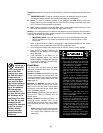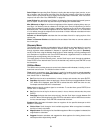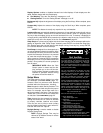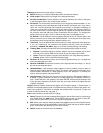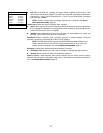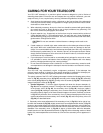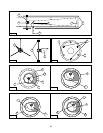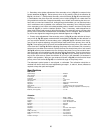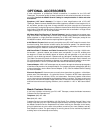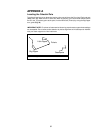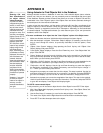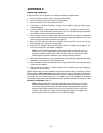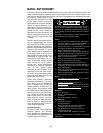
35
In the early 17th century Italian Scientist Galileo, using a telescope smaller than your DS-114AT
model, turned it skyward instead of looking at the distant trees and mountains. What he saw,
and what he realized about what he saw, has forever changed the way mankind thinks about
the universe. Imagine what it must
have been like being the first human
to see moons revolve around the
planet Jupiter or to see the changing
phases of Venus! Because of his
observations, Galileo correctly real-
ized Earth's movement and position
around the Sun, and in doing so,
gave birth to modern astronomy. Yet
Galileo's telescope was so crude, he
could not clearly make out the rings
of Saturn.
Galileo's discoveries laid the founda-
tion for understanding the motion
and nature of the planets, stars, and
galaxies. Building on his foundation,
Henrietta Leavitt determined how to
measure the distance to stars,
Edwin Hubble gave us a glimpse into
the possible origin of the universe,
Albert Einstein unraveled the crucial
relationship of time and light, and
21st-century astronomers are cur-
rently discovering planets around
stars outside our solar system.
Almost daily, using sophisticated
successors to Galileo's telescope,
such as the Hubble Space
Telescope and the Chandra X-Ray
Telescope, more and more myster-
ies of the universe are being probed
and understood. We are living in the
golden age of astronomy.
Unlike other sciences, astronomy
welcomes contributions from ama-
teurs. Much of the knowledge we
have on subjects such as comets,
meteor showers, variable stars, the
Moon, and our solar system comes
from observations made by amateur
astronomers. So as you look through
your Meade DS-114AT telescope,
keep in mind Galileo. To him, a tele-
scope was not merely a machine
made of glass and metal, but some-
thing far more—a window through
which the beating heart of the uni-
verse might be observed.
Autostar Glossary
Be sure to make use of Autostar’s
Glossary feature. The Glossary
menu provides an alphabetical list-
ing of definitions and descriptions of
common astronomical terms.
BASIC ASTRONOMY
This manual gives only the briefest introduction to astron-
omy. If you are interested in pursuing further studies, a
few topics are suggested below that are worth reading up
on. Try looking up some of these topics in the Autostar
glossary.
Also below is a small sampling of books, magazines, and
organizations that you might find helpful.
Topics
1. How is a star born? How does a solar system form?
2. How is the distance to a star measured? What is a
light year? What is red shift and blue shift?
3. How are the craters on our Moon formed? How old
is the Moon and Earth? How old is the Sun?
4.
What is a black hole? A neutron star?
5. What are stars made of? Why are stars different col-
ors? What is a white dwarf? Ared giant? Have we ever
seen the surface of a star besides our own Sun?
6. What is a nova? A supernova?
7. What are comets? Minor planets? Meteors? Meteor
showers? Where do they come from?
8. What is a planetary nebula? A globular cluster?
9. What is the Big Bang? Is the universe expanding or
contracting, or does it always remain the same?
What is dark matter?
10. What is an extrasolar planet? What is an accretion
(or protoplanetary) disk?
11. What is the difference between an elliptical, a spiral,
and an irregular galaxy?
Books
1. The Guide to
Amateur Astronomy by Jack Newton
and Philip Teece
2. The Sky:
A User’s Guide by David Levy
3.
Turn Left at Orion by Guy Consolmagno & Dan Davis
4. Astrophotography for the Amateur by Michael
Covington
Magazines
1. Sky & Telescope
Box 9111, Belmont, MA 02178
2. Astronomy
Box 1612, Waukesha, WI 53187
Organizations:
1. Astronomical League
Executive Secretary
5675 Real del Norte, Las Cruces, NM 88012
2. The Astronomical Society of the Pacific
390 Ashton Ave, San Francisco, CA 94112
3. The Planetary Society
65 North Catalina Ave, Pasadena, CA 91106
And watch Jack Horkheimer, Star Gazer, on your local
PBS station.



